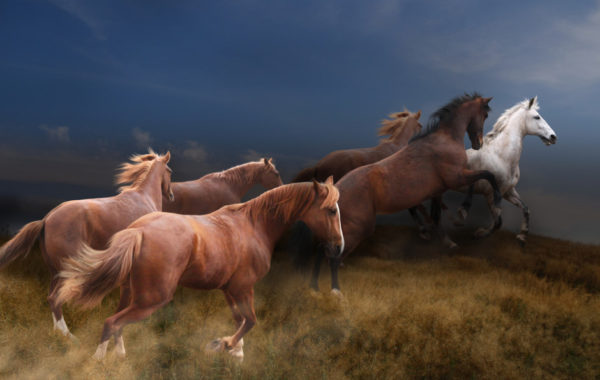In this edition of the Eponaquest News, author Linda Kohanov discusses the upcoming Connection Focused Therapy workshop in Minneapolis July 22 to 26, which she will be co-facilitating with Dr. Rebecca Bailey. Linda also presents a first look at Dr. Bailey’s new book on how the Polyvagal Theory by Dr. Stephen Porges enhances equine-facilitated therapy (EFP) practices and even helps to explain why EFP work with horses is so effective. Included in this newsletter is a brief look at why survivors of extreme experiences, including Jaycee Dugard, are using the Polyvagal Theory to offer a more fitting explanation of what has for years been characterized as the “Stockholm Syndrome,” a theory which Jaycee feels presents a grossly inaccurate picture of why people in abusive situations show a reticence to escape their captors.

After over a year of suspended workshops due to COVID 19, I’m so excited to get back in the saddle, so to speak, with a seminar near Minneapolis. Titled Healing the Herd, this Connection Focused Therapy® training was scheduled for last summer actually, but had to be postponed. It will be fun to see my colleague and friend Dr. Rebecca Bailey, with whom I am co-facilitating this very special seminar open to therapists, educators, equine-facilitated therapy and learning practitioners, and even family members who work and live with trauma survivors. (There are still spaces left. For more information on the five-day workshop, and to register: https://eponaquest.com/workshop/healing-the-herd-connection-focused-therapy-for-therapists-and-other-professionals-working-with-trauma-survivors-and-families-in-crisis-3/).
On a related note, I’m also very pleased to announce that Dr. Bailey’s new book, Equine Connections: Polyvagal Principles will be released July 1, just in time for this event. To preorder: https://drrebeccabailey.com/equine-connections-polyvagal-principles/.

I met Dr. Rebecca Bailey shortly after the publication of my 2013 book The Power of the Herd: A Nonpredatory Approach to Social Intelligence, Leadership, and Innovation. She reached out to me, in part, because the concept of “nonpredatory power” spoke to her many intense experiences supporting people who had suffered abuse at the hands of ruthless human predators. Dr. Bailey told me that equine-facilitated therapy was an important part of her practice serving numerous individuals and families. Over the next year, we compared notes and developed a modality called Connection Focused Therapy®, which employs horse-facilitated activities, mindfulness, emotional and social intelligence skills and innovative trauma recovery theories and practices.
At the time I began collaborating with Dr. Bailey, her client Jaycee Dugard was entering a new stage of growth and empowerment as a public speaker, author, and leader of her own foundation devoted to helping others heal from traumatic experiences. It was important for Jaycee, and the other survivors she and Dr. Bailey were assisting, to be able to assert themselves and protect those most dear to them without associating the concept of power with the predatory tactics and motivations of their abusers. In this sense, horse-inspired insights took us all to a new level of understanding and self-mastery.
Horses are herbivores, and they can be preyed upon in nature, yes, but they are not quivering gutless victims. Horses are powerful, courageous, intensely mindful, socially-intelligent animals that live by the code of mutual aid and the deep connections that arise when mammals form the bonds central to herd life. Mature horses are very dangerous prey, especially when they work together to protect more vulnerable herd members. Smart predators, in fact, avoid attacking large herbivores in their prime. Lions tend to creep around the edges of such herds, waiting for opportunities to single out younger, older, or injured animals. Human predators tend to do the same thing.
The power of a fully conscious, fully empowered herd is therefore significant. And it is based, first and foremost, on safety through connection. Over the years, we noticed that people who felt that they couldn’t trust humans were transformed by their interactions with these beautiful, graceful, gentle yet powerful animals. And yet, we realized that the success of these interventions also depended upon the ability of the therapists, horse professionals, and support staff involved to create a safe, congruent, trustworthy container for such experiences to occur.
This is a tall order, as it turns out. Many barns—and equestrian pursuits in general—are based on competition. All too often, this gives rise to the predatory urge to use others’ vulnerabilities against them for personal gain, a common, though often unconscious approach in business, education, sports and other human pursuits where the goal is to profit, excel and win at all cost. Many family systems in our highly competitive culture also adopt such attitudes, which manifest as sibling rivalry, bullying, and other forms of mental, physical and emotional abuse. Competitive and other, even mildly predatory perspectives must be consciously, carefully and relentlessly excised from any operation that offers horse-facilitated therapy. For this reason, creating safe spaces is a key part of Dr. Bailey’s staff training and educational programs for therapists, law enforcement, judges, and equine-facilitated therapy practitioners. This is where understanding the Polyvagal Theory can be especially helpful as well.
While Dr. Bailey and I created the Connection Focused Therapy model before we encountered the Polyvagal Theory, it was truly a revelation to access this scientific explanation of the mammalian nervous system. It first of all explained so much about why horse-facilitated interventions were innately effective. If you can’t trust humans, you can still form meaningful, healing, restorative connections with mammals who are also designed to seek safety through connection. But horses take it one step further. They are not predators, and they approach the world in a different way than most of our other animal companions, including dogs and cats, who are carnivores. To be in the presence of large, powerful, nonpredatory animals, to learn from their perspectives and behavior, to be welcomed into their herds, are uniquely transformational experiences, whether or not you are negotiating the effects of trauma or neglect.
In essence, the Polyvagal Theory helps explain why connecting with horses—and a properly trained therapeutic community of professionals supporting horse-facilitated work—literally retrains, and optimizes, the human nervous system.
I am immensely grateful to Dr. Bailey for introducing me to this theory. It has changed our work in significant ways, helping us to tweak our equine-facilitated activities, and the sequence of these activities, to address the nervous systems of our clients directly. When combined with the other therapeutic techniques and psycho-social educational components we use, polyvagal-based concepts and insights dramatically increase the effectiveness of work with survivors of extreme experiences, as well as the trainings we offer for therapists, educators, and even family members of those supporting survivors.
Dr. Bailey was introduced to Dr. Stephen Porges’s work through a mutual a friend. Not only did the Polyvagal Theory enhance her therapeutic practice, it also brought clarity to an issue that she and Jaycee Dugard had been grappling with for years. The two had been searching for an alternative explanation to the media driven term “Stockholm Syndrome,” a now popular explanation of why people don’t break away from captive situations. One of the most disagreeable notions widely disseminated through the Stockholm Syndrome theory is that captives “fall in love” with their abusers.
Jaycee and other survivors were adamant that they did not fall in love with their captors. Instead, they learned how to appease a predatory abuser in order to successfully survive a horrific situation. The Polyvagal Theory’s discussion of the dorsal vagal (shut down) response to stress explains a little recognized alternative to the flight or fight response that many survivors adopt. Dr. Porges’s concept of “Neuroception,” our unconscious scanning of the environment for signs of safety or danger, goes even farther to explain the genius of our body’s response to life-threatening situations, and most importantly, the challenges people face in moving beyond survival patterns when opportunities for rescue, safety and recovery finally present themselves.
In their work together, and in subsequent conversations with Dr. Porges, Dr. Bailey and Jaycee came up the concept of “appeasement,” which they are just now starting to share in media interviews, webinars, public presentations, and in their trainings for first responders, law enforcement, judges, and therapists.
Whether or not you work with survivors of extreme experiences, Equine Connections: Polyvagal Principles is an important book for professionals who support people facing all kinds of challenges. It’s filled with illuminating and intensely moving stories that support Dr. Porges’s theory, and provide a window into how and why equine-facilitated work incorporating the Polyvagal Theory is especially powerful. In reading this book, I came to a much greater understanding of the theory itself and how to better implement it in my own equine-facilitated practice. At the same time, I was continuously uplifted and sometimes brought to tears by the stories Dr. Bailey shares. To feed the brain, the heart and the soul in any book is a remarkable achievement. I’m pleased to say that Dr. Bailey has done exactly that in this carefully crafted introduction to how we can all benefit from combining Polyvagal principles with equine-facilitated work.
NOTE: For those of you living in Europe, the Healing the Herd: Connection Focused Therapy program originally scheduled in Germany in 2020 but postponed because of COVID has now been rescheduled and will take place at Hof Ter Weyden in Essen, Belgium September 24-28, 2021. For more information or to register https://eponaquest.com/workshop/healing-the-herd-connection-focused-therapy-for-therapists-and-other-professionals-working-with-trauma-survivors-and-families-in-crisis-2/.
An internationally-recognized pioneer in the fields of equine-facilitated learning and equine-facilitated therapy, Linda Kohanov is the author of The Power of the Herd, The Tao of Equus, and other books on the healing potential of the horse-human bond. For more information on her workshops, online course, and other events, check out her websites: www.eponaquest.com, www.connectionfocusedtherapy.com, and www.masterherder.com